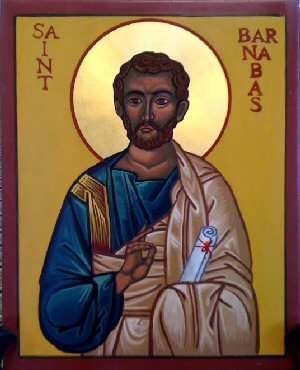By Rev. Stephen Kern
Acts 11:19-30; 13:1-3 Psalm 112 Mt 10.7–16

A blessed feast of St Barnabas to each of you and to your community-beloved of our Lord and St. John. St. Barnabas is the patron saint of the enchanted land of Cyprus. I think we ought to plan a pilgrimage, maybe in the dark months of February to see his tomb, discovered around 480 after a dream given to Bishop Anthemios showed him the location of the long lost saint’s resting place.
Barnabas was a Hellenic Jew who seems to have returned to Jerusalem where he had both family, he was a cousin of John Mark, and also land. It is probable that he became a convert after Peter’s mighty spirit-filled preaching at Pentecost. Though a Levite, he was moved to tremendous generosity by the sacrifice of Christ and sold a field he owned and gave the proceeds to help with the material needs of the community. No wonder his common Jewish name, Joseph, was eclipsed by his new nickname, son of encouragement.
As you know he was not one of the original 12 apostles, the “sent out” ones. But he quickly rose to a level of near apostolic authority. Tertullian claimed he was the author of the book of Hebrews though of course we are not certain of its authorship. Nonetheless we do know of his powerful success as a missionary in partnership with St. Paul as described in Acts chapters 13-15. It makes for good reading on this day.
Let’s look at some of his actions that express his gift of encouragement.
- Without counting the cost to himself, he sold a chunk of his personal property to personally invest in the ministry of the young church community. Of course this bold action, arising from his own generosity encouraged others to do the same. Maybe as we pray for generous donors we ought to be praying for those with the gift of encouragement to stand up and take the lead to help us!
- When the early church was reluctant to accept Paul as a member, given his violent and public persecution of the church (aiding and abetting the murder of my own namesake), Barnabas literally stood up for Paul as in Acts 9:27 and introduced him to the apostles in Jerusalem.
- Because of the diaspora resulting from the martyrdom of Stephen, Hellenic Messianic Jews from Phoenicia, Cyprus and Antioch went out and found success preaching to gentiles in the city of Antioch. This was such an irregular innovation of the Spirit (speaking of salvation to non-Jews?!) that Barnabas was sent out to investigate. As an encourager who had learned to look for the fruits of grace in others’ lives, he rejoiced when he saw gentiles come to faith. Though a Levite himself, he welcomed the new Gentile converts and opened a vast new opportunity for the young hitherto exclusively Jewish young church. Barnabas thought to himself, “hey, Paul might be interested in this work.” So he went to Tarsus and brought Paul back to see this new work himself. We can say that it was Barnabas who introduced to the ministry to the gentiles, a ministry that was to define St. Paul for posterity. As an aside, note that it was unknown and unnamed believers who first heard the Spirit’s call to share Jesus with the gentiles….Barnabas and Paul followed later.
- Barnabas became a leader in the church at Antioch and was an effective evangelist. From there he and Paul were sent out on a remarkably successful evangelistic tour. They also met with opposition by both Jews and gentiles. They were alternately perceived as gods- Barnabas as Zeus and Paul as Hermes, or stoned as heretics. With such up and down success and violence, they no doubt would both often draw on Barnabas’ encouragement. What they experienced is what our Lord describes in the reading from Matthew, for those who were sent out as sheep among wolves. They experienced the vulnerability of poverty, the generosity of self-forgetful service, the freedom of travelling lightly (not even carry-on luggage!), and a beggar’s level of food insecurity. In all of these ways they willingly became among the lowest of the low in order to reach some with the good news of resurrection life in the power of the Holy Spirit. Even with the blessings and the responsibility of power to work miracles I am sure they needed all the encouragement Barnabas could offer. Disciples need encouragement. Encouragers need encouragement. How are we doing? Is there an encourager in the community? Can we be an encourager?
Barnabas’ life and ministry continues to inspire. He shows us that with all of the passion of devotion, with all the graces of the holy spirit, with the Dunamis- the power of God in us, we sometimes just can’t get along with our ministry partners. As you all know, Barnabas and Paul had a fierce falling out over whether John Mark ( Barnabas’ cousin) ought to rejoin their missionary work or not after leaving them mid mission the first time around. A fantastic dynamic duo were broken up, and we have no record of them ever cooperating again, though it does seem from Paul’s letters that he was amicably inclined to both Barnabas and John Mark. Sometimes it seems grace has a long fuse before igniting.
But here’s the thing: despite the acrimonious split, the work of the two great apostolic non-apostles was actually multiplied. Going their separate ways the ministry to the gentiles expanded and accelerated. God is able to redeem even our failures at healthy community. Thanks be to God, our great wonder-working God who is able to redeem all things. Amen.


